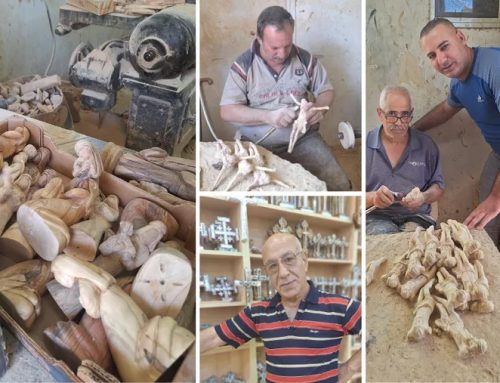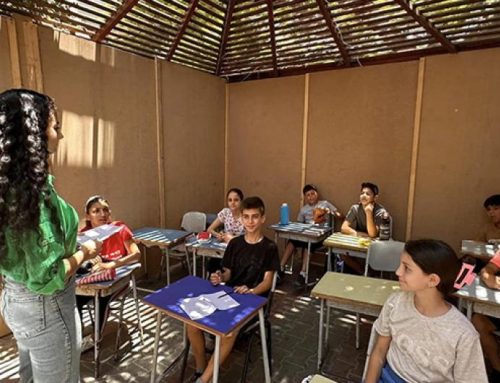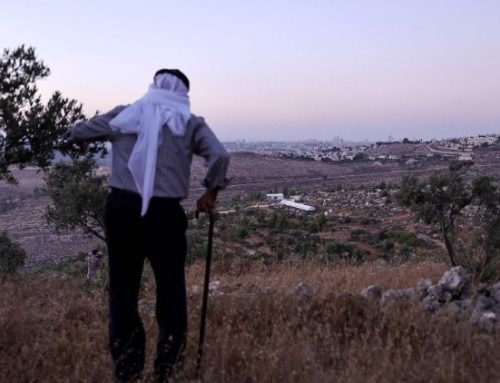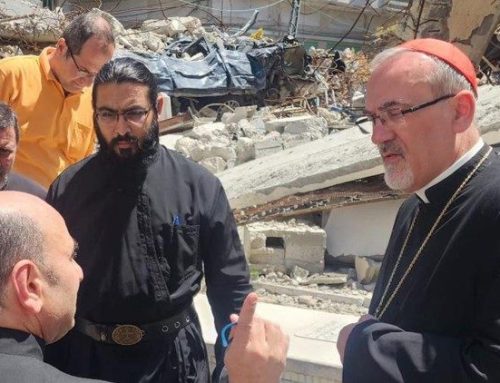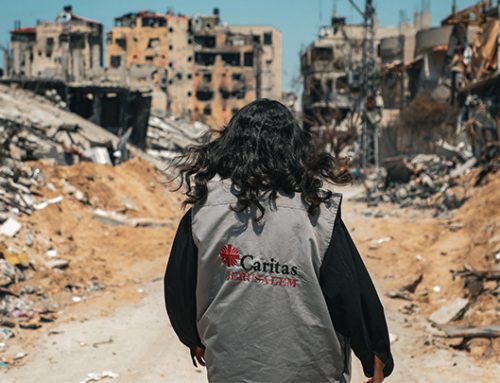Between 15 and 22 February 2001, a delegation of Pax Christi International, visited Israel, the Occupied Palestinian Territories and the areas under Palestinian self-rule. The major aim of the visit was to learn how the possibilities of peace negotiations are seen in light of the change in administration in the United States and the election of Ariel Sharon as Prime Minister of Israel.
If you want peace, work for justice
Pax Christi International
President and Bishops Statement
On Israel & Palestine
Preamble
Between 15 and 22 February 2001, a delegation of Pax Christi International, visited Israel, the Occupied Palestinian Territories and the areas under Palestinian self-rule. The major aim of the visit was to learn how the possibilities of peace negotiations are seen in light of the change in administration in the United States and the election of Ariel Sharon as Prime Minister of Israel. In addition, the delegation went to learn about new developments on issues such as Jerusalem and the settlements. The delegation met with Palestinian and Israeli officials and NGOs, religious leaders and representatives of international organisations and governments. The delegation also visited the Hebron and Bethlehem.
The members of the delegation were Mgr Adriaan van Luyn (Bishop President of Pax Christi Netherlands, on 20 and 21 February), Prof. Willem van Genugten (Professor in international law at the University of Tilburg and in human rights at the University of Nijmegen, the Netherlands), Tijl Declercq (Former member of the Belgian parliament and the Parliamentary Assembly of the Council of Europe, and chair of the Middle East working group of Pax Christi Flanders), Fr Paul Lansu (International Secretariat Pax Christi International) and Marjolein Wijninckx (Middle East programme Pax Christi Netherlands).
A report has been made available in three languages. Delegation members have been doing advocacy programmes at the United Nations Human Rights Commission in Geneva, the European Union in Brussels, UNESCO in Paris, the Council of Europe in Strasbourg. Most of the member organisations of Pax Christi International have been involved in advocacy work towards their political decision makers and church representatives on the national level.
In line with the above-mentioned report, this statement, which follows is signed by bishops presidents, bishops members and presidents of Pax Christi International and is a follow-up initiative is order to raise awareness among the ongoing conflict.
If you want peace, work for justice
(1) On September 28, 2000 the second Intifadah erupted. As we anguished over this recent cycle of violence and the collapse of talks to bring about a negotiated settlement to the conflict between Israel and Palestine, we are reminded of the prophetic words of Pope Paul VI, “If you want peace, work for justice.”
(2) The future for Israelis and Palestinians can only be a common future where each party must respect the rights and traditions of the other. It is time to return to the principles of international legality: the banning of the acquisition of territory by force, the right of peoples to self-determination, respect for the resolutions of the United Nations and the Geneva Conventions. The Church should insist with all the means at its disposal on redefinition of the conflict. The core of the question is the Israeli military occupation of Palestine and the Palestinian claims for their freedom and land.
Respect for International Law: A Precondition for a Just Peace.
(3) For there to be a true and lasting peace in the region we believe that negotiations should ultimately lead to a sovereign, viable Palestinian state, with Jerusalem as the capital of two states, accessible to followers of the three monotheistic religions. Pax Christi International has always emphasized that respect for international law is the only way for a just and durable peace. We believe that the framework of peace negotiations should include the following four principles of international law:
1. The recognition of the right to self-determination of the Palestinian people as well as Israel’s right to secure and recognized borders.
2. The full Israeli withdrawal from the territories occupied in 1967
3. The right of return of the Palestinian refugees.
4. Respect for human rights by all parties.
(4) Both Israeli and Palestinians must recognize their respective rights to their own state where their people can live in peace and security. We believe that Palestinian rights and Israeli security are not mutually exclusive, but mutually dependent on each other.
The full Israeli withdrawal from the territories occupied in 1967
(5). The full Israeli withdrawal from the territories occupied in 1967, and the dismantling of all settlements as stipulated in UN Security Council Resolutions 242 and 338 as well as the right to protection against (further) annexation of Occupied Territories and forced changes in the demographic composition of Jerusalem is foundational to building a lasting peace.
(6) The establishment and maintenance of Israeli settlements in the Occupied Territories and in the Gaza Strip is in violation of the provisions of the Fourth Geneva Convention relative to the Protection of Civilian Persons in Time of War. Article 49 says that the occupying power shall neither deport residents of the occupied territory nor transfer parts of its own civilian population into the territory it occupies.
(7) We believe that Israel’s security interests are enhanced by a withdrawal from the Occupied Territories where the military would no longer need to defend isolated settlements and military outposts.
The right of return of the Palestinian refugees
(8) United Nations Resolution 194 specifically refers to the right of return for Palestinians made refugees in 1947-48. It stated that the refugees were entitled to either compensation or the return to their homes.
(9) While we uphold the ideal of multi-cultural states, we recognize Israel’s fear that allowing large numbers of Palestinian refugees back into Israel may have a profound demographic impact on the Israeli state. If the two principles: the Israeli role in creating the refugee situation and of the right of return for refugees, were recognised by Israel, the application of the right of the return may be more easily discussed and various solutions may be found.
Respect for human rights by all parties
(10) Both Israel and the Palestinian areas have been pulled down in a hopeless spiral of violence. While it is true that the economic and military hardships imposed in the West Bank and Gaza Strip, road closures and attacks by the Israeli military have infinitely aggravated the situation, and while the Palestinian National Authority has difficulties to exert complete control, we nevertheless call on them to do whatever possible to stop the violence. At the same time we believe the Israeli government must do more to stop the violence on its side, for instance, that of settlers in the Occupied Territories against the Palestinians.
Moving Beyond the Legal Framework
(11) While respect for international law is the only road towards a just and durable peace, we believe that a legal framework by itself will not be enough to bring peace to this troubled land. As the Pope has rightly pointed out, “We all know that real peace can only be achieved if there is a new attitude of understanding and respect between the peoples of the region, between the followers of the three Abrahamic religions.”
(12) For this reason we condemn the misuse of religious teachings and passions to promote hatred, mistrust and to incite violence towards others. We reject the use of the Scriptures by some Jews to justify the expropriation of Palestinian land and property in the name of a “Greater Israel” as well as of those who preach hatred of Palestinian Arabs. At the same time we reject the way Islam is used by some to promote hatred of the Jewish people. We condemn all those who preach hatred of Palestinian Arabs or of the Jewish people.
(13) As Christians with a long and unfortunate history of anti-Semitism we acknowledge that some Christians also play a part in the misuse of religious teachings and passions to promote hatred and mistrust. For this reason we reject the view of some Christians, who misuse the Bible to justify the Israeli occupation of Jerusalem and the Occupied Territories in the false belief that rebuilding the Jewish Temple is a pre-condition to the Second Coming of Jesus.
A Call to All People of Good Will
(14) As Pax Christi bishops and presidents we call on all Catholics and on all people of good will to pray, study and act for peace in the Middle East in the spirit of Pope John Paul II who called us, “to break down the walls of hostility and division and to build together a world of justice and solidarity.”
(15) We call on people to study the current situation in the Middle East, and if possible, to participate in Middle East delegations to build relationships with our Israeli and Arab brothers and sisters.
(16) We also call on people to act for peace and to support those in Israeli and Palestinian society who continue to do so. In particular we call for all people of good will to offer financial support to the Christian Churches and Palestinian refugees of the Middle East and those who continue to suffer under occupation. We call on people to organize interreligious dialogues between Christians, Muslims and Jews to promote better understanding and stronger relationships. We encourage parishes to organize educational events to promulgate papal and bishop conference statements on the Middle East. We call on all people to speak out publicly against all forms of anti-Semitism. We also encourage the organizing of non-violent public actions to promote peace with justice in the Middle East.
A Call to the Governments of the United States and European Union
(17) Finally we call on all Catholics and people of good will to join us in urging our governments to take the following steps:
1. To provide financial and diplomatic support for those forces within Israel and Palestine who have been working tirelessly for peace with justice through non-violent means. We believe that these voices of non-violent struggle must be lifted up and encouraged in every possible way.
2. To implement fully Resolution 1322 of the UN Security Council, which calls for the creation of an independent international Commission of Enquiry to discover the causes of the current crisis and assess responsibility for the violence on all sides.
3. To make UN Resolutions #242 and #338 the cornerstone of their Middle East policy in practice as well as principle. Negotiation should implement these fundamental terms for peace not substitute for them; it should not require further sacrifices from the weaker party in the name of false spirit of “compromise.”
4. To support the establishment of an international force of observers in the Occupied Territories to act as a deterrent to violence from all sides.
5. To pressure Israel and the Palestinian National Authority to comply with international human rights standards and the rule of law under all circumstances.
6. To support a truly international approach to negotiations that would be created by the United Nations General Assembly and built on the legal framework outlined above.
7. Finally, in a post-conflict stage, we call on our governments to support reconciliation and dialogue between Israel and the Palestinians to preserve long-term peace and security. We also call for our governments to provide economic development aid in the region in order to encourage fair trade between all nations based upon the concept of sustainable development.
Reason for Hope
(18) In spite of all the diplomatic setbacks and continuing cycles of violence, as people of faith, we believe there is reason for hope for peace in the Holy Land. We are encouraged by the many groups of Israeli and Palestinian peacemakers who have taken great risks for the cause of peace.
Pax Christi International,
November 2001
Signatories
November 2001
* H.B. Michel Sabbah, Latin Patriarch of Jerusalem and President of Pax Christi International.
* Most Rev. Hilaire Barbier, archevêque de Bourges.
* Rt. Rev. Diego Bona, Bishop of Saluzzo, Bishop President of Pax Christi Italy.
* Most Rev. Raymon Bouchex, archevêque d’Avignon.
* Rt. Rev. Jean Luc Brunin, évêque auxiliaire de Lille.
* Prof. Joseph Camilleri, President Pax Christi Australia.
* Rt. Rev. Gérard Defois, évêque de Lille.
* Rt. Rev. Henri Derouet, Former Bishop of Sées and d’Arras, and President of Pax Christi France.
* Rt. Rev. Jean Charles Descubes, évêque d’Agens.
* Rt. Rev. Dr. Heinrich Fasching, Auxiliary Bishop of Sankt Pölten, Bishop President of Pax Christi Austria
* D. Januário Torgal Ferreira, Evêque des Forces Armées et de Sécurité, Président de Pax Christi Portugal.
* Most Rev. Francois Garnier, archevêque de Cambrai.
* Dr. Fuad Giacaman, President of the Arab Educational Institute, Bethlehem, an Affiliated Organisation with Pax Christi International
* Monseigneur Grab, OSB, évêque de Chur, président de la Conférence des évêques de Suisse.
* Rt. Rev. Victor Guazzelli, Bishop President of Pax Christi UK.
* Rt. Rev. Marcel Herriot, évêque de Soissons.
* Rt. Rev. Jean Paul Jaeger, évêque d’Arras.
* Rt. Rev. Augustino Nomura Junichi, Bishop of Nagoya, Councillor with Pax Christi in Japan
* Rt. Rev. Czeslaw Kozon, Bishop of Kopenhagen and Contact Bishop Pax Christi Denmark.
* Rt. Rev. Paul Lanneau, Auxiliary Bishop of Malines-Bruxelles, Councillor with Pax Christi Wallonie-Bruxelles, Belgium.
* Rt. Rev. Vaclav Maly, Auxiliary Bishop of Prague, Czech Republic, and Member of the Executive Committee of Pax Christi International.
* D. Manuel Martins, former bishop president Pax Christi Portugal.
* Most Rev. Laurent Monsengwo, Archbishop of Kisangani, DRCongo, and Vice President of Pax Christi International.
* Rt. Rev. Pierre Raffin, évêque de Metz.
* Rt. Rev. Joseph Spital, Former Bishop of Trier and President of Pax Christi Germany.
* Rt. Rev. Walter Sullivan, Bishop of Richmond and Virginia, Bishop President of Pax Christi USA.
* Rt. Rev. Adrian H. van Luyn, SDB, Bishop of Rotterdam, Bishop President of Pax Christi Netherlands.
* Rt. Rev. Robert Wattebled, évêque de Nimes.
* Dr. Michel Van Zeebroeck, President of Pax Christi Wallonie-Bruxelles, Belgium.

